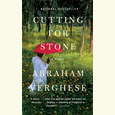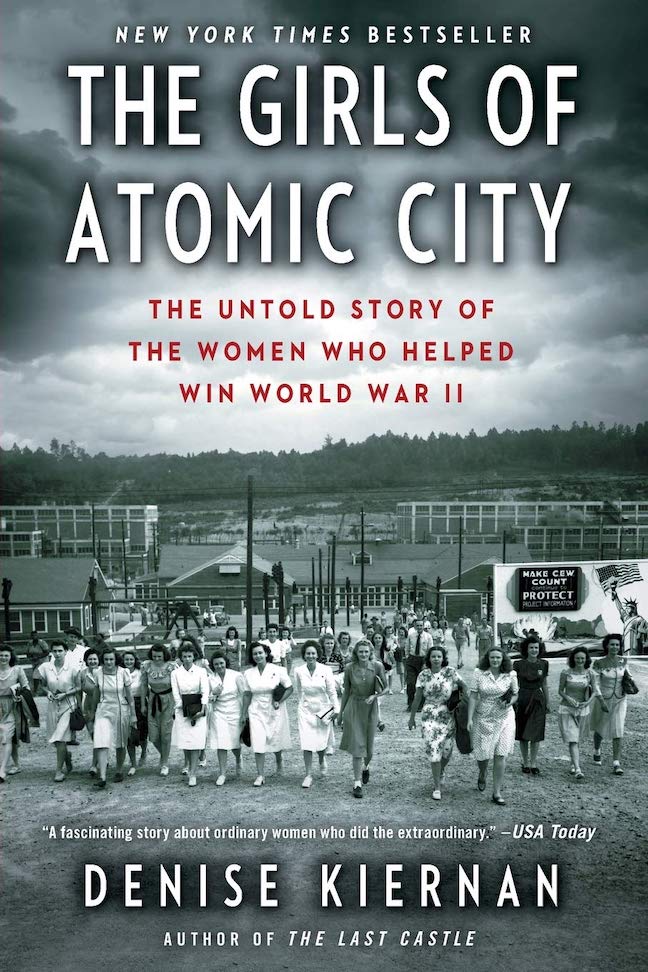Be Curious. Be Brave. And Don’t Get Bangs.
Reese Witherspoon gives young women a road map for finding their own future
Sometimes I think about all the things I wish I could tell my younger self—things like, “Don’t give in to peer pressure,” and “Don’t get bangs just because your friend Ashley did,” and “Don’t go to that party at Maggie’s house sophomore year—everyone’s going to make bad decisions and turn on you, and you’ll have to call your mom to pick you up.” But since it’s too late for me, I figured I should tell you a few things.
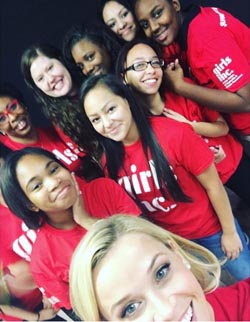 Here’s the best advice I can give to anyone about the future: be curious. If you’re curious, you’ll never be bored. The world will open itself up to you over and over. When I was your age, I didn’t know what I wanted to do with my life. I had done a few acting projects, but I didn’t think that would be my entire career. It seemed very impractical to my parents, who were doctors, so I went to college. I thought I was going to be a pre-med major because my whole family was in the medical profession, but I could not stop telling stories. I wrote stories and filmed stories at college. I was obsessed with my filmmaking class, obsessed with my creative-writing class.
Here’s the best advice I can give to anyone about the future: be curious. If you’re curious, you’ll never be bored. The world will open itself up to you over and over. When I was your age, I didn’t know what I wanted to do with my life. I had done a few acting projects, but I didn’t think that would be my entire career. It seemed very impractical to my parents, who were doctors, so I went to college. I thought I was going to be a pre-med major because my whole family was in the medical profession, but I could not stop telling stories. I wrote stories and filmed stories at college. I was obsessed with my filmmaking class, obsessed with my creative-writing class.
By the time I was a sophomore at Stanford, I knew more about storytelling than about anything medical, and I realized it was OK not to do what my family did. I could do something completely different. But I had to be brave. I had to push myself to feel comfortable living in California, where I knew no one, in a business where I had no friends.
It’s important to be brave, even in high school. Even if you’re not an artist, take an art class. You’ll learn to understand and appreciate artistic minds. I took a photography class in high school, and even though my photos were awful and uninspired, I loved learning about Tim Burton and Terence Malik and other cool movie directors I had never heard of. My teacher’s enthusiasm made me enthusiastic to explore the work of many different filmmakers and try to understand their ideas and techniques. High school is a great time to explore. So even if it’s not your strong suit, try some things. If you’re not an athlete, join a team. You’ll learn more about collaboration, respect, and leadership than you will in any class.
And listen to your teachers. A truly great teacher can teach you more about yourself than any specific subject, and they’ll stay with you long after you graduate. My European History teacher taught me so much about the importance of understanding other cultures, and to this date my senior thesis on Ingmar Bergman is the longest, most intricate paper I have ever written—and that includes college! He taught me to be a citizen of the world. My French teacher instilled in me a love of languages and gave me the courage to communicate. I still don’t speak French fluently, but when I am in Paris, I try. And even if people laugh at my accent, they are much friendlier because they know I have respect for their culture and their language.
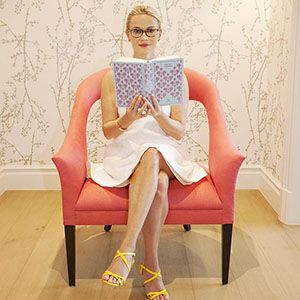 The high-school English teacher I had for two years gave me the greatest gift of my career, which is the ability to analyze literature. She taught me to relate characters to other people I have known and try to unlock the truth of human behavior through storytelling. Which is why I have been able to understand every character I have played, from Elle Woods to Cheryl Strayed, with more clarity, and why I’m able to help authors turn novels like Gone Girl and Luckiest Girl Alive into screenplays. I understand the power of great storytelling because of my high-school English classes.
The high-school English teacher I had for two years gave me the greatest gift of my career, which is the ability to analyze literature. She taught me to relate characters to other people I have known and try to unlock the truth of human behavior through storytelling. Which is why I have been able to understand every character I have played, from Elle Woods to Cheryl Strayed, with more clarity, and why I’m able to help authors turn novels like Gone Girl and Luckiest Girl Alive into screenplays. I understand the power of great storytelling because of my high-school English classes.
Now, I have to be honest about algebra, geometry, and calculus: I never use any of them in my job. For any reason. Ever. But I will say that I learned the discipline of homework from those classes, and I learned the value of working to the best of your ability at something, even if it isn’t your life’s passion. Hard work is important.
And by the way, I failed my calculus class. Straight-up F.
And since we’re talking about it, there is nothing wrong with failure. Don’t be afraid to make mistakes. Too many girls I know don’t want to try things because they’re afraid they’ll be bad at it, and they want to be perfect. Perfectionism is for the birds. It’s not realistic. It is stressful. And it really gets you nowhere. In her new book, Big Magic, Elizabeth Gilbert talks about perfection as just another form of fear. “Perfectionists decide in advance that the end result is never going to be satisfactory, so they don’t even bother trying to be creative in the first place,” she writes. “Perfectionism is a deep down existential angst that says, again and again, I am not good enough.”
You don’t learn anything from being perfect. I have chosen the wrong movies and the wrong friends and the wrong boyfriends, and all of those mistakes have taught me more about myself than a lot of my successes.
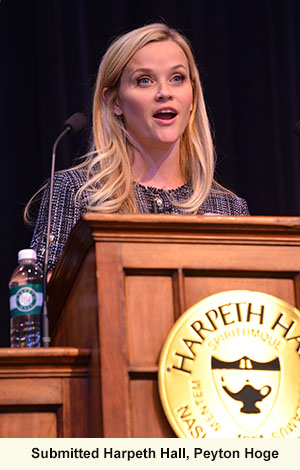 And when you mess up, because you will, never be afraid to admit when you’re wrong. If you do something you’re not proud of, say you’re sorry right away, and mean it. Everyone screws up. The difference ends up being who’s willing to own up to it and who’s not.
And when you mess up, because you will, never be afraid to admit when you’re wrong. If you do something you’re not proud of, say you’re sorry right away, and mean it. Everyone screws up. The difference ends up being who’s willing to own up to it and who’s not.
And when you find something you love to do, be brave. Follow your passion. Get a job. It doesn’t matter if it’s not your dream job. Work creates work. And you’ll learn things from the job you don’t want that will help you get the one you do.
Learn how to pay your own bills and invest money. Money is freedom. And, truthfully, it’s power. Don’t ever let people tell you that talking about money is rude. Talking about money with your family and your spouse is important because it is life planning. You need to know how much money you’ll need to make your dreams possible, and you can’t do that when you think it’s not polite. So work hard and don’t blow your money—the best thing in the world is when you have a nest egg so you can feel like tomorrow anything is possible.
And if you want to have real influence in this world, have your own political ideas. Not those of your family, or your best friend, or your boyfriend. Your own. Even if no one agrees with you. The dinner-table conversation will be louder, but it’ll also be more interesting. Because everyone’s different perspectives are important, we need your participation. Each of your ideas is unique and important in this world. Get off the sidelines and put yourself in the game. Don’t stand to the side and ask to be invited.
Women are fifty percent of the population, but only nineteen percent of the government. Shouldn’t we be making the decisions about our own bodies, about how we treat other people in other countries? Shouldn’t we have a say in creating economic growth by using local resources—saving our families, our schools, and our planet? That cannot happen if you do not step up.
You are in a position of power in this world. You are educated. You are free. You are curious and capable. So be brave. Travel to other countries where you don’t know the language. Read a book about genetics; it will inform your future. Challenge yourself physically. Climb a mountain—and I don’t mean a metaphorical mountain. I mean go outside and get up that mountain. I’ve done it. It’s hard! But it’s worth it. And please don’t worry about being cool. Be warm and friendly. Southern people are friendly. It’s a wonderful thing. The world loves our accent. Don’t ever lose it!
Be honest.
Be graceful.
Be yourselves.
And, seriously, I wasn’t kidding: don’t get bangs just because your friend does.
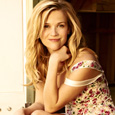
Copyright (c) 2015 by Reese Witherspoon. All rights reserved. Reese Witherspoon is a Nashville native, an advocate for women, an entrepreneur, and an Academy Award-winning actor. This essay was adapted from a speech she gave last month to the students of Nashville’s Harpeth Hall School, where she received the 2016 Distinguished Alumna Award.

